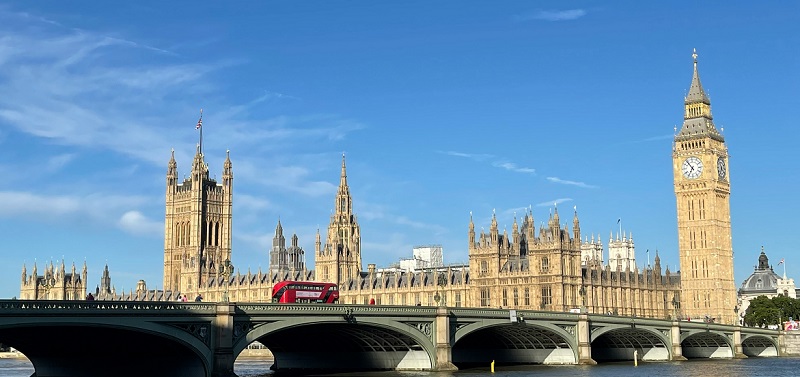What the King’s Speech means for Liverpool City Region
Posted on: 18 July 2024 by Cleo Hachem and Dr Tom Arnold in Blog

Yesterday’s King’s Speech set out the first pieces of legislation to be brought to Parliament under the new Labour government. The speech included 40 bills covering a wide range of policy areas, but with a particular emphasis on improving economic growth, new infrastructure and energy security.
In this blog, Cleo Hachem and Tom Arnold highlight the implications for Liverpool City Region in key areas such as economic development, devolution and planning.
Economic Stability and Growth
The King’s Speech outlined the new government's intention to foster economic stability and growth to overcome the ongoing challenge of the cost-of-living crisis. The Budget Responsibility Bill has grabbed headlines for its direct attack on “the mistakes of Liz Truss”, pledging any budget or other fiscal event will be subject by law to an independent assessment by the Office for Budget Responsibility. Perhaps more consequential in the long-term is the proposed National Wealth Fund which will be established to “directly invest in the priority sectors set out in the (Labour) manifesto in every corner of the country”. The fund will be managed by the UK Infrastructure Bank, with details on the projects it will support to follow over the coming months.
Several bills focus on improving workers rights and employment conditions. The Employment Rights Bill will ban “exploitative” zero hour contracts and increase statutory sick pay – a commitment likely to have a particular impact on the hospitality sector, which accounts for around 10% of jobs in Liverpool City Region. Plans to reform the apprenticeship levy through the Skills England Bill aim to increase ensure access to apprenticeships and break down barriers to opportunity while aligning skills training with supplying skills needed for economic development. The legislation will create a new body, Skills England, which will take on functions currently performed by the Institute for Apprenticeships and Technical Education (IfATE), including setting out occupational routes into a variety of industries. The new body will bring together mayoral combined authorities (including Liverpool City Region) to identify issues with the apprenticeship system and advise government on reform.
Devolution
The English Devolution Bill looks set to standardise the mayoral combined authority (MCA) model across England, “making devolution the default setting” without the need for extensive negotiations between local authorities and central government – a move hinted at in Labour’s election manifesto. For Liverpool City Region, and other places with MCAs already in place, the bill primarily focuses on improving governance arrangements – although details on what this will entail are currently scarce. The background briefing note published alongside the King’s Speech does indicate the bill may devolve more spatial planning powers. While Liverpool City Region is currently developing its Spatial Development Strategy, many MCAs have been reluctant to take on strategic planning responsibilities.
Housing, planning and infrastructure
The Planning and Infrastructure Bill represents the first steps in Labour’s plans to increase housebuilding rates and unlock energy infrastructure, pledging to “streamline” the planning system. Many of the headline measures included in the bill had already been trailed, such as increasing capacity within local authority planning departments and reforming the compulsory purchase system to speed up development. However, the promise to “modernise” planning committees is new, and it will be intriguing to see how this commitment is implemented.
In the more immediate term, the Renter’s Rights Bill seeks to improve security of tenure and enhance rights for tenants living in privately rented homes. Almost one in four homes in Liverpool City Region are privately rented, and the Liverpool City Region All-Party Parliamentary Group has previously called for reforms to improve energy efficiency and housing quality in the sector.
The King’s Speech also includes several notable pieces of transport legislation. The Passenger Railway Services (Public Ownership) Bill amends existing legislation to effectively transfer train operating companies to public ownership once current contracts come to an end. Building on this, the Railways Bill will bring management of passenger services and the infrastructure network under a single public body – Great British Railways.
There may also still be a future for high speed rail in Northern England – if not in the form of HS2 Phase 2, which was scrapped by Rishi Sunak last autumn. The High Speed Rail (Crewe to Manchester) Bill, repurposed from the last Parliament, will be used to explore options for East-West rail links across the North. Liverpool City Region Mayor Steve Rotheram, now part of the new Liverpool-Manchester Railway Board, will be keen to see some benefit to the region if plans for high-speed rail return. Liverpool City Region is something of a pioneer in bringing buses back into public control – something which all parts of England will be enabled to do under the Better Buses Bill.
The King’s Speech contained few major surprises but re-emphasises the cautiously interventionist approach to economic strategy set out during the election campaign. The commitment to devolution will be welcome in Liverpool City Region, as will the positive noises on aligning skills policy with local needs. However, there are indications that the new government won’t shy away from forcing local authorities and MCAs to be more ambitious on housing and infrastructure. The coming months will provide more clarity about the role of local leaders in Liverpool City Region and other parts of England can play in delivering the ‘change’ promised by the new government.
Keywords: .